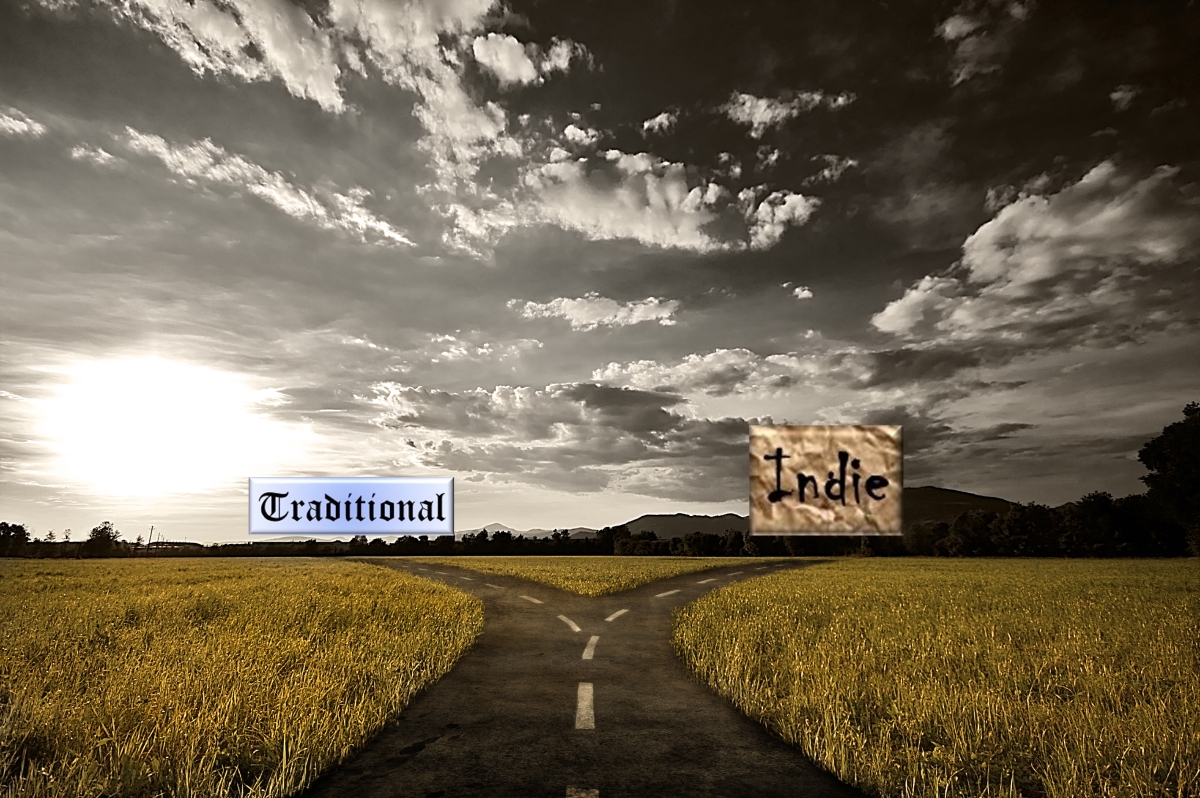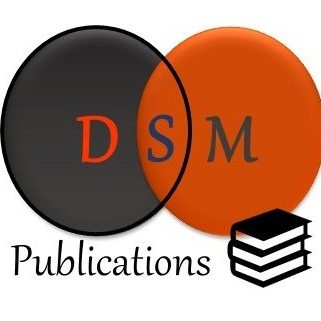 Jumping into the indie author scene, for me, was a calculated risk. Like I do with a lot of decisions, I looked at the pros and cons.
Jumping into the indie author scene, for me, was a calculated risk. Like I do with a lot of decisions, I looked at the pros and cons.
Pros:
- You can easily publish your work on a number of platforms at little or no cost (Amazon, Nook, Smashwords, etc.).
- The royalties for sales are good. If you price a book on Amazon over $2.99, for instance, you will get 70% of the selling price as royalties.
- You can write at your own pace in whatever style you want.
- You can directly interact with your readers on many platforms (blogs, mailing, lists, social media, author signing events).
- There is an organized community of independent authors and you can learn from others and help others that are just getting started.
- My writing would be judged directly by the readers and not some low-on-the-totem-pole publishing house employee looking for the flavor of the month.
- Trend-setters like Hugh Howey and Mark Dawson are putting independent authors on the map ranking higher than some traditional best-selling authors.
- You have creative control over everything! You can select your own cover, hire an editor (or not), title your book, and write in whatever genre you want to.
Cons:
- Just like with the indie music world, there is a lot of variety out there. There is also variable levels of quality. Poor spelling, grammar, and formatting occurs at a much higher frequency in the work of indie authors.
- Getting recognized is hard work. There is no publishing house promoting your book, issuing press releases, and setting up interviews. You are your own social media and blogger.
- You have creative control over everything! There are no focus groups to select your cover for you or advise you on a title or a genre to write in. You are it.
Obviously, the pros outweighed the cons for me. The main factor was my age. Becoming a novelist after age 50 is daunting enough without the rejection letters and constant queries to publishing houses that don’t want unproven ‘seasoned’ authors. I wanted to get my writing out there and let the readers tell me if it stunk or not. Of course, my first reader was my wife of 30 years. I knew that she would not ‘blow smoke’ if she didn’t like my writing. She liked the first book and that gave me the confidence to move to the next step.
I hired a very intelligent, long-time friend of mine to be my editor. When I say ‘hired’, that’s a bit of a stretch. She edited the book for free with the promise of whatever I could pay her as the book made profits. I knew that, as a friend, this wouldn’t just be a job for her, she would also tell me if the book had weak points, which it did, and be honest about it’s viability, which she was.
In the end, it all worked out. I am now six novels in, along with two non-fiction books and a book of short stories. I still have the same passion I did in the beginning. Am I ready to quit my day job? Not yet. Although, my earnings from writing have doubled each year since I started. Each book I release seems to outperform the previous one. I must be doing some things right.
The one piece that still is elusive is getting that recognition. I’m doing what I can, but it’s still a challenge. Last year, I created a street team. I honestly didn’t think that anyone would be interested in promoting my books. I solicited interest from my mailing list and immediately got responses. Instead of the two or three I expected, I got 30 volunteers in the first several hours and cut off the street team membership at that number. They have been a loyal group trudging out to bookstores and libraries loyally with the promise of signed copies of my latest book. I owe them tremendously.
I would love to have this post start off a discussion. What journey did you go through as an independent author? What has worked and what hasn’t? Let’s help each other.
As always, your comments are most welcome.

Reblogged this on Chris The Story Reading Ape's Blog and commented:
Call over to Don’s original blog post and join in the discussion 😎
LikeLiked by 1 person
Thanks for sharing this, Chris.
LikeLiked by 1 person
Welcome, Don – I hope you get lots of discussions 😃
LikeLiked by 1 person
I don’t write fiction on the whole and so the market is slightly different. I’ve been published and self published. I did not enjoy the former… all the work at preparation and promotion, with few rewards for a book I was not overly happy with when it was printed.
The same book was withdrawn from the publisher and re-published independently. I created a far better cover, redesigned the interior, edited what had been missed and it sells far better than it did before…with no publisher’s cut.
Unless I was approached with a substantial advance (and pigs will fly before that happens in my field) I would prefer self-pub all the way.
LikeLiked by 2 people
I totally agree, Sue. Self-publishing has many resources out there for editing, cover design and formatting that raise the quality to an equal playing field with traditional publishing. I’ve also heard many traditionally published authors say that much of the marketing and promotion was still on their shoulders. Thanks for chiming in.
LikeLiked by 1 person
I’m actually enjoying the continual learning curve it takes too 🙂
LikeLiked by 1 person
I learned a great deal working in a bookstore for many years. Although traditionally published authors have reps promoting their work, many bookstore owners seem open to carrying an indie author’s book(s), either on a trial basis or on consignment. Granted, the author has to do the footwork, but developing a personal relationship with proprietors works to the author’s advantage, especially if they’re local. I’ve only published independently and doubt I’d change that. I enjoy the freedom it affords.
LikeLiked by 1 person
Thanks for the insight, Tina. I’ve also done some book signings at libraries and have donated books to the library. I’ve seen my books get purchased and distributed within the county’s library system as a result.
LikeLiked by 1 person
Welcome, Don, and thanks for the tip. I need to revisit my libraries.
LikeLiked by 1 person
Nice job breaking it down for us. Another thing to possibly consider is that if the work is really good, sometimes traditional publishers will buy the books even if they start out self-published. Scalzi’s “Old Man’s War” and Amanda Hocking’s books started out that way
LikeLiked by 1 person
Very true. Good indie novels often have a strong following that the author established. This can be attractive to publishers.
LikeLiked by 1 person
Reblogged this on Author Don Massenzio and commented:
Check out this post from my DSM Publications blog on choosing between the traditional and indie publishing paths.
LikeLike
Reblogged this on Anna Dobritt — Author.
LikeLiked by 1 person
Thanks for sharing this, Anna.
LikeLike
This was a great post, Don. I am on the road to self-publishing, and I’m very excited about it. Sites like this are so helpful. I have also found that the vast majority of marketing duties fall to me, despite having a publisher behind me.
LikeLiked by 1 person
That’s what I’ve heard from many traditionally published authors. Publishing houses tend to concentrate all of their marketing dollars on the well-known authors and leave the rest to fend for themselves.
LikeLike
Reblogged this on Viv Drewa – The Owl Lady.
LikeLiked by 1 person
Thanks for sharing this, Viv.
LikeLiked by 1 person
You’re very welcome, Don! Have a great weekend!
Hugz on owl wings! @v@ ❤
LikeLiked by 1 person
You too.
LikeLike
An excellent post, Don. I was fortunate to have a publisher offer me a contract with my first submission. Although I have released two novellas and one full length novel on my own, I’ve been with a traditional publisher since I started. If I had more time on my hands (and didn’t work a full time job) I might be tempted to do more indie releases, but I’ve got a good deal with my house and have been really happy with them. I think a lot of it comes down to finding the right fit for each of us as writers. Right now, traditional publishing works for me, but I know that route may not always be available to me.
LikeLiked by 1 person
Thanks Mae. You are one of the fortunate few. If you can find a publisher that will devote time to your work, you are very fortunate. I wish you continued success.
LikeLiked by 1 person
Thanks, Don! 🙂
LikeLiked by 1 person
Great post. It was the way I decided to go after a lot of thought, too. It is time consuming and may have some extra costs, but worth it. There is so much to learn, but the information and help is out there. Finding a self-published author with a following is a bonus now to traditional publishers. I am glad writers now have choices.
LikeLiked by 1 person
Thanks for the great thoughts on this. Platforms like Amazon and others have become equalizers. We are seeing the cream of the indie author crop rising to the top of the success ladder. Eliminating the middleman and interacting directly with the readers is my favorite part of the indie road.
LikeLiked by 1 person
Super stuff, Don. I agree with you on Indie.
LikeLiked by 1 person
Thanks, John.
LikeLiked by 1 person
Reblogged this on Plaisted Publishing House and commented:
It is nice to read someone elses journey as an Author. I really need to finsih my publishing journey blog…It’s not forgotten just delayed due to life.
LikeLiked by 1 person
Thanks for sharing this.
LikeLiked by 1 person
Welcome Don
LikeLiked by 1 person
Reblogged this on When Angels Fly.
LikeLiked by 1 person
Thanks for sharing this.
LikeLike
Welcome!
LikeLiked by 1 person
Welcome Don!
LikeLiked by 1 person
Congratulations on your Street Team! You’re definitely doing something write. 🙂
LikeLiked by 1 person
Reblogged this on Writer's Treasure Chest and commented:
Don Massenzio gives us his advice on picking the right direction – Indie or Traditional. Thank you very much for helping us all, Don!
LikeLiked by 1 person
Thanks for sharing this
LikeLiked by 1 person
You’re very welcome, Don.
LikeLiked by 1 person
[…] Indie or Traditional – How does an author pick the right direction? […]
LikeLiked by 1 person
Thanks for sharing this, Stevie.
LikeLike
[…] Indie or Traditional, How Does an Author Pick the Right Direction – DSM Publications […]
LikeLiked by 1 person